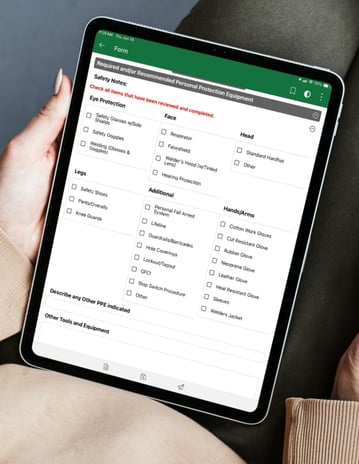Fargo, ND – December 17, 2025 – OmniByte today announced a strategic global partnership with...
IFS Advanced Forms: Empowering Enterprise Mobile Workforces with Real-Time Data Solutions
The modern enterprise landscape demands agility, accuracy, and instant access to critical operational data. For organizations with mobile workforces spanning construction sites, manufacturing facilities, and field service operations, the challenge of capturing structured, real-time data has never been more pressing. Traditional paper-based processes create bottlenecks that slow decision-making, introduce errors, and limit operational visibility.
IFS Advanced Forms emerges as a purpose-built solution designed.png?width=406&height=406&name=OBT%20%20Social%20Media%20(78).png) specifically for enterprise organizations managing mobile teams.
specifically for enterprise organizations managing mobile teams.
This sophisticated platform transforms how businesses collect, process, and utilize data—creating a seamless bridge between on-site operations and back-office systems. By enabling real-time data capture and automated workflows, IFS Advanced Forms addresses the fundamental challenges that have long plagued mobile workforce operations.
The platform’s impact extends far beyond simple digitization. Organizations implementing IFS Advanced Forms report significant improvements in operational efficiency, data accuracy, and decision-making speed. Field technicians spend less time on administrative tasks and more time delivering value to customers. Management gains unprecedented visibility into operations, enabling proactive resource allocation and strategic planning.
This comprehensive analysis explores how IFS Advanced Forms revolutionizes mobile workforce management, examining its core capabilities, real-world applications, and measurable business impact for enterprise organizations.
Why Mobile Workforce Management Requires Advanced Digital Solutions
Enterprise organizations with mobile workforces face unique operational challenges that traditional office-based solutions cannot address. Field technicians, construction crews, and service personnel operate in dynamic environments where connectivity may be intermittent, conditions change rapidly, and accurate data collection is mission-critical.
The complexity of mobile workforce management stems from several factors. First, the distributed nature of operations makes real-time communication and data sharing difficult. When field teams cannot access current information or share updates instantly, decision-making suffers and opportunities for optimization are lost. Second, the variety of data types collected in field operations—from equipment readings and GPS coordinates to digital signatures and photographic evidence—requires sophisticated capture and processing capabilities.
Mobile workforce management also demands robust offline functionality. Field operations often occur in locations with limited or no internet connectivity, yet work must continue uninterrupted. Traditional cloud-based solutions struggle in these scenarios, creating gaps in data collection and workflow continuity. Organizations need platforms that can operate seamlessly regardless of connectivity status while ensuring data integrity and synchronization when connections are restored.
The stakes are particularly high for enterprise organizations where mobile workforce inefficiencies can impact thousands of employees and millions in revenue. A construction company managing multiple job sites simultaneously cannot afford delays in progress reporting or resource allocation. A manufacturing organization with field service teams supporting critical equipment needs instant access to maintenance histories and parts availability.
These challenges require more than basic mobile applications or simple form builders. Enterprise mobile workforce management demands integrated platforms that connect field operations with enterprise systems, provide sophisticated data validation and processing capabilities, and support complex workflows across multiple departments and locations.
IFS Advanced Forms: A Platform Built for Enterprise Mobile Operations
IFS Advanced Forms represents a fundamental shift in how enterprises approach mobile data collection and workforce management. Unlike generic form builders or basic mobile applications, this platform is specifically engineered for the complex requirements of enterprise mobile operations. The solution integrates natively with IFS Cloud, IFS FSM, and IFS Apps10, creating a unified ecosystem where field data flows seamlessly into enterprise systems.

The platform’s architecture reflects deep understanding of mobile workforce challenges. Cross-platform support ensures consistent functionality across iOS, Android, and Windows devices, accommodating diverse hardware preferences and organizational standards. The interface design prioritizes usability in field conditions, with intuitive navigation and optimized performance that reduces training requirements and accelerates user adoption.
Enterprise forms solution capabilities extend well beyond basic data collection. The platform supports rich media capture including photographs, video, digital signatures, and GPS coordinates, enabling comprehensive documentation of field activities. Barcode scanning functionality streamlines asset tracking and inventory management, while advanced calculations and conditional logic create intelligent forms that adapt based on user input.
The no-code configuration approach empowers business users to create and modify forms without technical expertise. This capability is particularly valuable for enterprise organizations where different departments have unique requirements and workflows change frequently. Forms can be configured for specific roles, locations, or project types, ensuring field personnel see only relevant information and required fields.
Integration capabilities represent perhaps the most critical aspect of the platform. Near real-time synchronization with enterprise systems ensures that field data immediately becomes available to back-office personnel, while information from enterprise systems automatically populates forms to reduce manual entry. This bidirectional data flow creates a unified information ecosystem that eliminates silos and enables organization-wide visibility.
Real-Time Data Capture: The Foundation of Modern Field Operations
Real-time data capture transforms the fundamental dynamics of mobile workforce operations by eliminating the delays and disconnects that plague traditional processes. When field technicians can instantly transmit service reports, inventory updates, and customer information to enterprise systems, the entire organization operates with current, accurate data.
The impact of real-time data capture extends across multiple operational dimensions. Customer service representatives gain immediate access to field activity updates, enabling them to provide accurate status information and proactive communication. Inventory managers receive notifications of parts usage, triggering reorder processes before stockouts occur. Billing departments can process invoices immediately upon service completion, accelerating cash flow and reducing administrative overhead.
Mobile data collection through IFS Advanced Forms ensures data quality through built-in validation and error checking. Field personnel receive immediate feedback on incomplete or inconsistent entries, preventing the submission of flawed data that could impact downstream processes. Inline validations guide users through proper data entry procedures, while conditional logic ensures that forms adapt appropriately based on specific scenarios or requirements.
The platform’s offline capabilities ensure that real-time data capture continues even in challenging connectivity environments. Field teams can complete forms and capture information regardless of network availability, with automatic synchronization occurring once connectivity is restored. This approach eliminates data gaps while maintaining the benefits of real-time processing when conditions permit.
For enterprise organizations, the strategic value of real-time data capture cannot be overstated. Management decisions based on current information are inherently more effective than those relying on outdated reports. Resource allocation becomes more responsive to actual field conditions rather than historical assumptions. Customer satisfaction improves when service delivery is based on real-time operational visibility rather than delayed reporting cycles.
Measuring Success: ROI and Performance Improvements
The business impact of IFS Advanced Forms implementation extends across multiple performance dimensions, creating measurable improvements in efficiency, accuracy, and customer satisfaction. Organizations typically experience immediate benefits in the form of reduced paperwork processing time and improved data quality, with longer-term gains in operational efficiency and strategic decision-making capability.
Productivity improvements represent the most immediately visible benefit of implementation. Field personnel spend significantly less time on administrative tasks when paper forms are replaced with intelligent digital alternatives. Pre-populated fields eliminate redundant data entry, while conditional logic ensures that users see only relevant questions and requirements. Organizations commonly report 20-30% reductions in form completion time, translating directly to increased billable hours and improved resource utilization.
Data accuracy improvements deliver both immediate and long-term value. Inline validation and error checking prevent the submission of incomplete or inconsistent information, while automated data transfer eliminates transcription errors. Organizations report error rate reductions when compared to paper-based processes, resulting in fewer customer complaints, reduced rework, and improved employee job satisfaction.
The acceleration of business processes creates significant financial impact through improved cash flow and reduced administrative overhead. When service completion automatically triggers billing processes, organizations can invoice customers immediately rather than waiting for paperwork to be processed. This acceleration typically reduces billing cycles, improving cash flow and reducing accounts receivable.
Customer satisfaction improvements result from more professional service delivery and improved communication. Digital documentation creates professional reports that enhance customer perception of service quality. Real-time updates enable proactive customer communication, while accurate service records support better ongoing relationships.
Conclusion: The Future of Mobile Workforce Management
The transformation of mobile workforce operations through IFS Advanced Forms represents more than simple digitization—it
fundamentally changes how enterprise organizations capture, process, and utilize operational data. By eliminating paper-based
processes and creating seamless integration between field operations and enterprise systems, the platform enables new levels of efficiency, accuracy, and strategic insight.
The benefits extend well beyond immediate operational improvements. Real-time data capture creates the foundation for advanced analytics and artificial intelligence applications that can optimize resource allocation, predict maintenance requirements, and enhance customer experiences. Organizations that implement comprehensive mobile workforce management solutions position themselves for continued innovation and competitive advantage.
For enterprise organizations evaluating mobile workforce management solutions, the choice is increasingly clear. Traditional approaches that rely on paper forms and manual processes cannot compete with integrated platforms that provide real-time data capture, automated workflows, and seamless system integration. The question is not whether to modernize mobile workforce operations, but how quickly organizations can implement solutions that deliver measurable business value.
IFS Advanced Forms provides the comprehensive capabilities that enterprise organizations need to transform their mobile workforce operations. From construction sites to manufacturing facilities to field service operations, the platform enables organizations to capture accurate, structured data in real-time while streamlining workflows and improving operational efficiency.
The future belongs to organizations that can leverage their mobile workforces as strategic assets rather than operational necessities. IFS Advanced Forms provides the foundation for this transformation, enabling enterprise organizations to compete effectively in an increasingly digital business environment.



